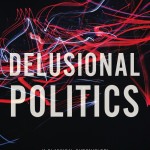Hardeep Singh Puri, currently a member of Prime Minister Modi’s cabinet and a former Indian diplomat, takes the reader on a whirlwind tour of a world that he sees as predominantly characterised by delusional decision making, in his latest book, Delusional Politics. He covers the themes of Brexit, the rise of populist leaders, and delusion in global governance, trade policy and the fight against terrorism. These themes may, at first glance, look disparate, but there emerges an overarching theme of decision-making gone awry.
“Many democratically elected leaders of the twenty-first century display streaks of recklessness, megalomania, bizarre self-obsession and political views that are difficult to characterise,” he writes. Yet their image stays intact in the eyes of supporters, which is a reflection of the mainstream media not performing its investigatory or contrarian role. Puri’s view is that Trump’s election win and Brexit were the result also of partisan commentators, incentivised to prop up a false narrative; they failed to account for the angst of those who voted for Trump and Brexit, and then found such outcomes shocking.
In the first half of the book, Puri goes to the heart of what led to Trump and Brexit: the democratic process. He cites American sociologist, Arlie Hochschild’s book, Strangers in their own Land, where the author, through her interviews across the American Rust Belt, found that many of the people who proclaimed their support for Trump projected themselves as “victims without a language of victimhood”. They feared losing honour; they also supported politicians who “put God and family on their side”. These factors served as an effective base for Trump’s politics.
Emotion also characterised the way the Brexit vote was swung. The author states that the sole reason for it was David Cameron’s desire to cement his leadership of the Conservative Party where he faced the threat of an open rebellion. For, when in October 2011, 81 Conservative Members of Parliament had demanded a referendum to determine Britain’s relationship with the European Union, the ground for the vote had been laid. This act of rebellion was nothing but a result of festering anti-immigrant sentiment, which also led to people getting swayed by unexamined emotionalism regarding saving British culture – and thus voting for Brexit. In the author’s view, the actions that preceded, and are now unfolding in the wake of the Brexit vote, show that the United Kingdom “has now ended up on a path of devolution or unravelling, from an economic and once-territorial monolith, on to a path characterised by fragmentation”.
A third example of delusion and its unexpected consequences is Modi’s rise in India. Puri, who was also a minister during Prime Minister Modi’s first term in office (2014-2019), writes that his government represents a break from the past. It is one that focuses on the economy; the accent is on a strong central leader who heads an effective cabinet with a focus on performance delivery and efficiency, and, at the same time, does not shy away from stating its Hindu majoritarian credentials. He writes, “The citizens of this country are intrinsically drawn to his [Modi’s] vision that places a premium on development, one in which meritocracy trumps sycophancy to a dynasty”.
The author’s thesis includes delusion in global governance and the fight against terror. His earlier book, Perilous Interventions, showed the inability of the UN Security Council (UNSC) to fulfil its mandate of preserving peace in the world. The biggest threat to peace is the challenge of terrorism: he grants that the UNSC has made many multilateral efforts, but ambiguities in UNSC resolutions “and their uneven implementation have provided a convenient pretext for some to pursue double standards in the fight against terrorism”.
He points to the thorny question of a UN-recognised definition of what constitutes terrorism and the divided response it has elicited for two main reasons. First, whether the use of the armed forces of a country on an unarmed civilian population constitutes terrorism. Second, the question of whether a civilian population under an occupying force has the right to take arms: this will not, therefore, constitute terrorism. He further adds that the battle against terrorism is on shaky ground as it involves erosion of the rule of law, such as the invasion of Iraq by the United States. It also involves the arming of non-state groups to bring about geopolitical changes that favour a certain country. The fact that even a country like the United Kingdom continues to turn a blind eye to the South Asian diaspora, linked to terror groups in the subcontinent, points to the hollowness of this fight, he writes.
In conclusion, the author leaves the reader with a sense of hope. He advocates turning to profound and transformational ideas that are “more sensitive to the voice of the marginalised” and which do not produce and perpetuate falsehoods. Translating these ideas into real actionable governance may be a good starting point for combating delusional decision-making.
Delusional Politics by Hardeep Singh Puri (Penguin Viking, 2019)
Pranaav Gupta is a lawyer based in Mumbai. He was a student ambassador of Gateway House at the National University of Juridical Sciences, Kolkata.
This review was exclusively written for Gateway House: Indian Council on Global Relations. You can read more exclusive content here.
For interview requests with the author, or for permission to republish, please contact outreach@gatewayhouse.in.
© Copyright 2019 Gateway House: Indian Council on Global Relations. All rights reserved. Any unauthorized copying or reproduction is strictly prohibited.


